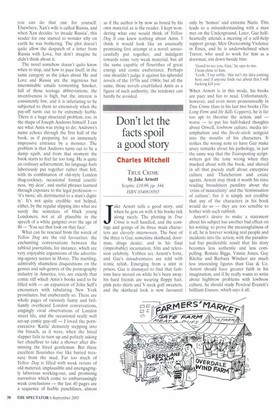Don't let the facts spoil a good story
Charles Mitchell
TRUE CRIME by Jake Arnott Sceptre, £10.99, pp. 344, ISBN 0340818565 Jake Arnott tells a good story, and when he gets on with it his books tick along nicely. The plotting in True Crime is well handled, and the comings and goings of its three main characters are cleverly interwoven. The best of the three is Gaz, sometime skinhead, doorman, drugs dealer, and in his final (improbable) incarnation, film and television celebrity. Yobbos are Arnott's forte, and Gaz's misadventures are told with ironic relish. Emerging from a stint in prison, Gaz is dismayed to find that fashions have moved on while he's been away: his hard friends are wearing floppy hair, pink polo shirts and V-neck golf sweaters, and the skinhead look is now favoured
only by tomos' and extreme Nazis. This leads to a misunderstanding with a man met on the Underground. Later, Gaz halfheartedly attends a meeting of a self-help support group, Men Overcoming Violence in Essex, and he is underwhelmed when Trevor, who used to work for him as a doorman, sits down beside him:
'Good to see you, Gaz,' he says to me. I lean close to him.
'Look,' I say softly, 'this isn't my idea coming here and if anyone finds out about this I will fucking kill you.'
When Arnott is in this mode, his books are pacy and fun to read. Unfortunately, however, and even more pronouncedly in True Crime than in his last two books (The Long Firm and He Kills Coppers), he is far too apt to theorise the action, and — worse — to put his half-baked thoughts about Orwell, lowbrow culture, media triumphalism and the fin-dc-siècle zeitgeist into the mouths of his characters. It strikes the wrong note to have Gaz make arsey remarks about his pathology, in just the same way that the Trainspotting scriptwriters got the tone wrong when they mucked about with the book, and shoved in all that pseudy stuff about enterprise culture and Thatcherism and estate agents. Arnott may think it worth his time reading broadsheet punditry about the 'crisis of masculinity' and the leminisation of culture', but it is simply not credible that any of the characters in his book would do so — they are too sensible to bother with such rubbish.
Arnott's desire to make a statement about his subject has another bad effect on his writing: to prove the meaningfulness of it all, he is forever working real people and incidents into the action, with the paradoxical but predictable result that his story becomes less authentic and less compelling. Ronnie Biggs, Vinnie Jones, Guy Ritchie and Barbara Windsor are much less interesting figures than Gaz & Co. Arnott should have greater faith in his imagination, and if he really wants to write about highbrow problems with lowbrow culture, he should study Percival Everett's brilliant Erasure, which says it all.










































































 Previous page
Previous page